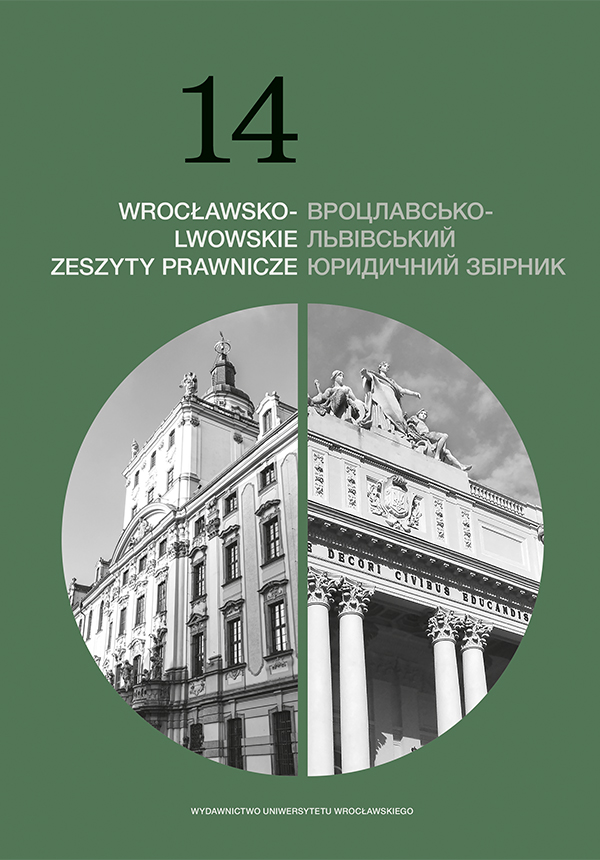

Artykuły

Artykuł poświęcony jest analizie teoretycznoprawnej praw do pamięci i praw do zapomnienia, w szczególności rozważane są problemy związane z interpretacją tych praw oraz wsparciem prawnym w ich realizacji. Uzasadniono znaczenie pamięci, w szczególności pamięci historycznej, dla rozwoju społeczeństwa, i potrzebę częściowej regulacji prawnej jej zewnętrznych przejawów, przede wszystkim w działalności uczestników stosunków społecznych, w tym utworzenia upamiętniających miejsc, organizaowania dni pamięci, wspierania finansowego archiwów.
Celem artykułu jest ogólna charakterystyka teoretyczna każdego z wymienionych praw naturalnych, zwrócenie uwagi na osobliwości wpływu prawa na procesy zapamiętywania i zapominania. Konieczność wzmocnienia ochrony prawa do poszanowania życia prywatnego i rodzinnego doprowadziła do ukształtowania się prawa do zapominania. W fachowych publikacjach periodycznych autorzy najczęściej analizują tylko niektóre aspekty związane z prawem do zapominania. Wśród prac naukowych należy wskazać badania takich naukowców, jak I. V. Spasibo-Fatieievej, O. V. Kijiiaka, P. M. Sukhorolskiego, R. I. Radeiki, O. M. Kalitenki. Jednak prawo do zapomnienia jest omawiane w tych publikacjach bez odniesienia do prawa do pamięci. Tymczasem między tymi prawami istnieje związek semantyczny, bo zapomnieć można tylko to, co zostało „umieszczone” w pamięci. Bez realizacji prawa do pamięci nie ma sensu mówić o prawie do zapomnienia.
W artykule sformułowano autorską interpretację pojęć pamięć, zapomnienie i naturalnego do nich prawa. Tak więc prawo do pamięci to zdolność osoby lub grupy osób do podejmowania działań mających na celu odtworzenie i zobiektywizowanie pomysłów lub poglądów dotyczących faktów z przeszłości. Prawo do zapomnienia to możliwość żądania przez osobę lub grupę usunięcia z przestrzeni publicznej informacji o pewnych faktach z przeszłości. Uzasadniono słuszność obawy, że możliwość usuwania pewnych informacji może być wykorzystywana nie jako środek ochrony w internecie, lecz jako sposób kontrolowania przestrzeni cyfrowej przez państwa.
Zwrócono uwagę na to, że praktyka sądowa odegrała istotną rolę w kształtowaniu prawa do zapomnienia i wciąż aktywnie wpływa na jego rozwój i ochronę. Choć na Ukrainie nie ma jeszcze wielu sporów sądowych dotyczących tej kwestii, rozwój prawa ukraińskiego jest w ten czy inny sposób związany z integracją i stowarzyszeniem Ukrainy z UE oraz stosowaniem orzecznictwa ETPC w postępowaniu przed sądami krajowymi. Aktywny rozwój technologii informacyjnych wymaga odpowiedniego teoretycznego zrozumienia tych praw człowieka.
Боднарук М., Damnatio memoriae, або Санкції проти пам’яті в римській культурі І ст. до н.е. – І ст. н.е., «Магістеріум» 2011, No 150 (45), с. 28–33.
Ільїн В, Memory studies: від пам’яті до забуття, «Проблеми всесвітньої історії», 2020, No3(3).
Комісарова О., Правозахисники звинуватили Китай у геноциді уйгурів, «Суспільне Новини», 2021, https://suspilne.media/amp/111794-pravozahisniki-zvinuvatili-kitaj-u-genocidi-ujguriv/.
Конституція України: Закон України від 28 червня 1996, N254k/96-VR, https://zakon.rada.gov.ua/laws/show/254%D0%BA/96-%D0%B2%D1%80#Text.
Коршак Н., В Одесі демонтували пам’ятник Катерині ІІ, «Суспільне Новини», 2022, https://suspilne.media/348338-v-odesi-demontuvali-pamatnik-katerini-ii/.
Кримінальний процесуальний кодекс України: Закон України від 13.04.2012, No 4651-VI, https://zakon.rada.gov.ua/laws/show/4651-17#Text.
Петречко О., Damnatio memoriae і становлення принципату, «Проблеми гуманітарних наук Серія: Історія» 2014, No 260 (34), с. 221–231.
Постанова Львівського апеляційного суду по справі від 30 листопада 2020, No 464/2809/19, https://reyestr.court.gov.ua/Review/93826723.
Про відзначення подвигу героїв бою під Крутами: Постанова Верховної Ради України від 16 травня 2013, No 261-VII, https://zakon.rada.gov.ua/laws/show/261-18#Text.
Про засудження комуністичного та націонал-соціалістичного (нацистського) тоталітарного режимів та заборону пропаганди їхньої символіки): Закон України від 9 квітня 2015, No 317-VIII, https://zakon.rada.gov.ua/laws/show/317-19#Text.
Про захист персональних даних: Закон України від 01 червня 2010, No 2297-VI, https://zakon.rada.gov.ua/laws/show/2297-17#Text.
Про заходи з відзначення у 2015 році 70-ї річниці Перемоги над нацизмом у Європі та 70-ї річниці завершення Другої світової війни: Указ Президента України від 24.03.2015, https://www.president.gov.ua/documents/1692015-18657.
Про розсекречення, оприлюднення та вивчення архівних документів, пов’язаних з українським визвольним рухом, політичними репресіями та голодоморами в Україні: Указ Президента України від 23.01.2009, No 37/2009, https://zakon.rada.gov.ua/laws/show/37/2009#Text.
Протестувальники в США знесли пам’ятники Христофору Колумбу та Джефферсону Дейвісу, «Радіо Свобода», 2020, https://www.radiosvoboda.org/a/news-columbus-davis/30664663.html.
Уоррен С., Брандейс Л., Право на приватність, 2013, http://nbuv.gov.ua/UJRN/prccha_2013_1-2_11.
Центр стратегічних комунікацій та інформаційної безпеки. Альтернативна історія: як Росія прагне анексувати Київську Русь, «Укрінформ», 2021, https://www.ukrinform.ua/rubric-antifake/3279397-alternativna-istoria-ak-rosia-pragne-aneksuvati-kiivsku-rus.html.
Google Spain SL and Google Inc v Agencia Española de Protección de Datos (AEPD) and Mario Costeja González, 2014, https://globalfreedomofexpression.columbia.edu/cases/google-spain-sl-v-agencia-espanola-de-proteccion-de-datos-aepd/.
Guide to the UK General Data Protection Regulation (UK GDPR), https://ico.org.uk/for-organisations/guide-to-data-protection/guide-to-the-general-data-protection-regulation-gdpr/.
Hurbain v Belgium, 2016, https://hudoc.echr.coe.int/fre?i=001-210884.
La redazione di archeome, Hatshepsut and the damnatio memoriae. 2020, https://www.archeome.it/ancient-egypt-hatshepsut-and-the-damnatio-memoriae.
Number of government and court requests for content removal from Google from January to June, 2021, https://www.statista.com/statistics/268257/goverment-requests-for-content-removal-from-google/.
Rosen J. The Right to Be Forgotten. Stanford Law Review Online 64(1-2), https://www.stanfordlawre-view.org/online/privacy-paradox-the-right-to-be-forgotten/.